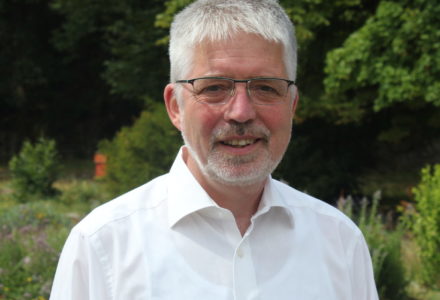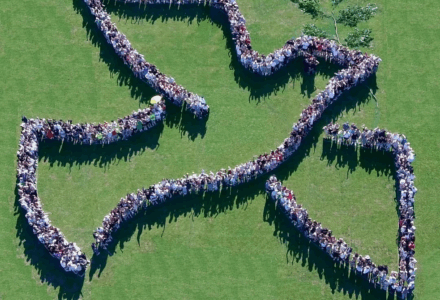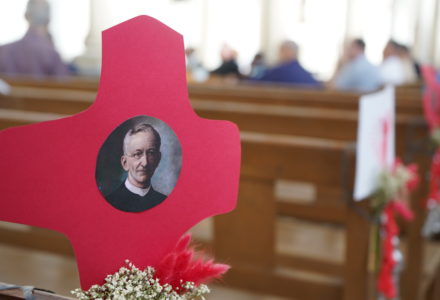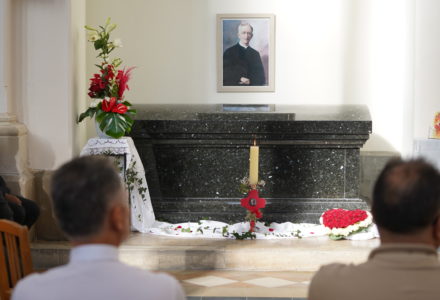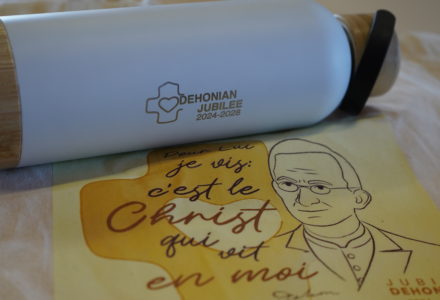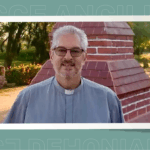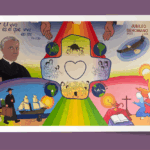On the occasion of the 100th anniversary of the death of their founder, Léon Dehon, the Priests of the Sacred Heart of Jesus are not just looking back but are questioning the meaning of his mission today. An interview with the Provincial Superior of Germany, Father Stefan Tertünte SCJ, on Dehon's political and spiritual legacy, the power of encounter, and the intelligence of the heart.
What is the first thing that comes to mind when you think of Léon Dehon?
Father Stefan Tertünte SCJ: 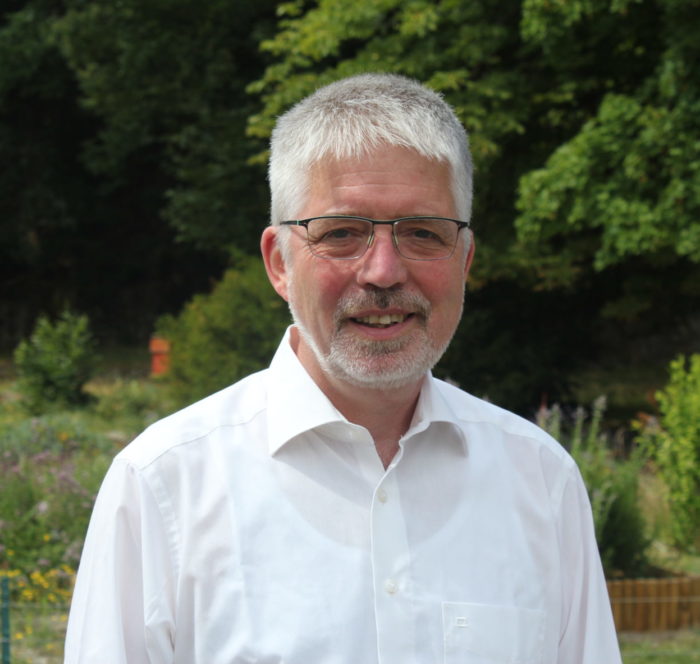 What I appreciate about Dehon always depends on my personal situation or the global situation. I find the politician he was, an Homo politicus through and through, to be admirable. I find that a very stimulating and positive example, especially today, including for us Dehonians. We must not lose that interest, that commitment, and that sensitivity, and not focus solely on purely spiritual commitments. At a time when there is so much political upheaval and so many worrying changes in the way politics is conducted and decisions are made, I find this all the more important. I am grateful that our founder gave us this guiding principle: Stay vigilant in political matters!
What I appreciate about Dehon always depends on my personal situation or the global situation. I find the politician he was, an Homo politicus through and through, to be admirable. I find that a very stimulating and positive example, especially today, including for us Dehonians. We must not lose that interest, that commitment, and that sensitivity, and not focus solely on purely spiritual commitments. At a time when there is so much political upheaval and so many worrying changes in the way politics is conducted and decisions are made, I find this all the more important. I am grateful that our founder gave us this guiding principle: Stay vigilant in political matters!
How is that expressed?
Dehon clearly knew that politics was a matter of Christian values. Politics must create the conditions for a dignified life for all human beings. In his time, this primarily applied to workers and their families.
How does Dehon’s political claim connect with his experience of faith, his image of Jesus?
That is a question we have always asked ourselves. Political commitment was in Dehon’s genes. It is part of his family DNA, which he explicitly embraced and lived out. But faith was also transmitted to him – a Christian faith that is closely linked to encounter. And that is our goal to this day. When we are in silent adoration before the Blessed Sacrament, these are moments of encounter, a sought-after, hoped-for encounter that cannot be demanded but is given. Dehon uses his own term for this, which is even more connected to our current identity: union. Union is an extension of encounter. For Dehon, as for us today, this means acting with Christ and like Christ – in commitment to the excluded, the poor, and the discriminated.
Father Dehon even goes further with his favorite Bible verse from the Epistle to the Galatians: “It is no longer I who live, but Christ who lives in me.” What did this verse mean for Dehon, and what does it mean for the Dehonian self-understanding?
When I think of Father Albert Bourgeois, the sixth Superior General of the Congregation, who co-wrote our Rule of Life, I always keep in mind that through contemplation and action, we create space for Christ’s action in us to take place, so that He is at work when we are at work. Our encounter with Jesus does not result in Him growing and us, conversely, shrinking and disappearing, but in us developing and maturing with Him and according to His purpose. That is why our commitment is not about executing tasks, but, as the Rule of Life also says, truly participating in Christ’s work of Redemption.
However, there is still a long way between such an intense experience of faith and the founding of an order. What was the decisive moment or motivation that moved Léon Dehon to take such a significant step?
There were essentially two points: Dehon knew that he could not manage and continue the tasks he had started with the school and the patronage for young workers in Saint-Quentin alone. The same applied to his spiritual life. That is why he strove very early on to form a community of priests who supported each other through prayer. He did not want to continue alone and sought a form for this at the beginning. That was the initial impulse for the founding of the Order.
At the end of the 19th century, an incredible number of religious communities were founded. Was it easy?
It was not easy. Maybe it was easy to have the idea. There was a real explosion of order foundations at that time, the vast majority of which no longer exist today. But precisely because of the multitude of foundations, the Holy See legitimately critically examined how substantial and sustainable each one was. Dehon was also confronted with critical questions. And that was completely normal so that what he had started could develop with good quality.
How was Dehon able to overcome the difficulties? He also did not know what would ultimately result from it.
No, but Dehon always asked himself the fundamental question: Is this God’s will or just my will? That was a vital question for him. Faced with all possible challenges, he did not just rely on what he could do with his qualities and skills, but he always reminded himself: Is this “only” me, or is it your will, O God? Some interpreted this as a weakness in leadership. But it is more about the fact that this question helped him to take ownership of his decisions and actions. And so, over time, he became increasingly certain that his foundation was blessed by God – with all its weaknesses and errors. And that is why he could persevere so tenaciously against all resistance.
What characterizes a Dehonian in 2025?
A Dehonian in Germany is part of a colorful and internationally composed community, which is currently reflecting on how we can move forward into the future in this diversity and difference. That is an important topic for us right now. At various levels and in a synodal manner, we are asking ourselves: What can and do we want to be in ten years? In addition, we are in a time when it is good for Dehonians to rediscover and further cultivate their contemplative side. I think it is very important and beneficial to seek and cultivate that intense encounter in silence. But it also seems important to me, in this era, that we commit ourselves more clearly to a democratic culture, which is given to us by the structure of our Order. We could then benefit even more from the fact that, in a time marked by so much migration, our religious province is also marked by migration.
What are three essential aspects of the Dehonian identity? What is truly central? What distinguishes Dehonians from other orders?
Often, identity is something that 90% of others can also have. Therefore, the core of our spirituality is the seeking and nurturing of the encounter: the encounter with God, the encounter with myself, and the encounter with confreres and other human beings. These encounters happen both in the church before the Blessed Sacrament in adoration, and in responding to the very concrete needs of the people we live with. The symbol of the heart is given to us. It encourages us to consider the intelligence of the heart. There are things that the heart understands better than reason. We must allow ourselves to be touched by the heart by what we experience around us and by what happens in this world. And we must not always respond purely rationally, but also speak with the heart. We will find the strongest answers to the most difficult questions if we allow ourselves to be touched by the Heart of Jesus.
How does one become intelligent with the heart; does one have to learn it?
The heart, as an organ of perception and a source of decisions and commitment, must indeed be educated. When we sit in silence before the Blessed Sacrament in adoration, it is also a mindfulness exercise, in which we silence many voices and open our inner antennae to hear and feel what is important now. That is why I believe that the Spirituality of the Sacred Heart and the intelligence of the heart are closely linked to mindfulness and people’s desire for full attention.
What very concrete Dehonian example illustrates what the Spirituality of the Sacred Heart wants and can achieve?
Spontaneously: 1000 students and teachers from the Leoninum in Handrup formed a human peace dove on Dehon Day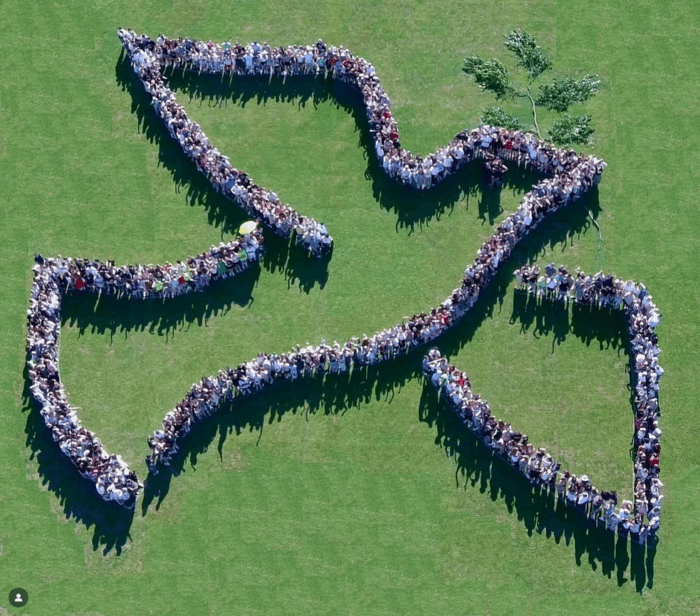 – that is exactly it! That is a political statement for peace and a sign that we must commit ourselves together. And if we can also contribute to entire school communities reflecting on this, it has the potential to become a Dehonian classic.
– that is exactly it! That is a political statement for peace and a sign that we must commit ourselves together. And if we can also contribute to entire school communities reflecting on this, it has the potential to become a Dehonian classic.
If you had to tell young people in one sentence why it is worth being a Dehonian – what would that sentence be?
With our spirituality and our way of living together, we also offer young people a very beautiful opportunity to seek with others what God has called them to in their lives. We do this in the diversity of our communities, in the diversity of our commitments, and in the intensity of our piety. Well, that’s two sentences…


